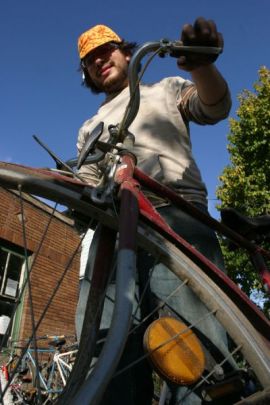Route 13, the four-lane highway that snakes north towards the Triphammer Mall, is a sort of tip of the hat to Ithaca’s commercial sector. Burps of car exhaust cast a peppery odor over convenience stores and gas stations. Rows of stoplights evoke a mini-Manhattan rush hour. For much of the day, it’s where otherwise good-natured townspeople gather to cut each other off and test the reliability of their car horns.

On this particular stretch of road, environmentally conscious institutions — especially those designed to disrupt the surrounding atmosphere’s noxious bustle — must work hard to conceal themselves. With its slumping visage and brick exterior, Recycle Ithaca’s Bicycles has a certain nondescript griminess to it. A driver catching the right combination of green lights could zoom past it without a glance.
But get wedged in traffic and that driver might spot a lively group — hands blackened with grease — exchanging tips and pleasantries. With an emphasis on cooperative learning, RIBs is a bike shop that lacks the usual bike shop features: There’s no cash register, no haggling, no buying or selling. Prospective riders start their own projects from scratch, exchanging volunteer time for parts, tools and expertise. Frames are selected from a tangle of donations in the back, and hours spent in the shop are logged casually on an oil-stained sign-up sheet near the entrance.
Ithaca College junior Mike Grippi is piecing together an ’80s-era Lotus road bike at RIBs. He said the shop’s sense of community is what sets it apart from other bike stores downtown.
“It’s democracy in its purest form,” he said. “You get a lot of local people, people from Cornell, people from Ithaca.”
RIBs began in 1990 with help from the Ithaca Green Party and the Southside Community Center. It changed locations twice before finally settling at the intersection of West Buffalo Street and Route 13 in late 2006. The building it occupies — an old sewer and pump house now surrounded by a colorful border of fused bike frames — is a testament to the institution’s commitment to sustainable re-use.
“There’s such a culture around it,” said junior Alex Rosenblatt, who’s been volunteering at RIBs for more than a year. “Places like RIBs bring people together and provide a place for people to meet and share knowledge.”
RIBs has restored more than 2,000 bikes since its creation. It also works closely with nearby universities, offering internship and work-study opportunities.
Wren Albertson-Rogers, a junior at Cornell University, said he chose his work-study at RIBs with an eye toward environmental issues.
“I’m doing it not to be in a ‘bike scene,’ but to use less carbon emissions and less money,” Albertson-Rogers said. “It’s obviously promoting self-sufficiency and sustainability through using your own bicycle.”
There are no age restrictions at RIBs, and it’s not uncommon to see a young professional and a grade-schooler hunched over the same warped wheel or fraying brake cable. Still, a commitment to sustainability is what unifies many of its devotees.
Grippi said concerns over the environment are part of his reason for restoring and riding bikes.
“One of the main motivators for me to build a bike and to ride is that gas is so ridiculous now,” Grippi said. “I can’t be driving to and from campus every day.”
Many students across the nation share Grippi’s woes, and some universities are listening. Ripon College in Wisconsin recently announced it would offer incoming freshmen a brand new Trek mountain bike — complete with helmet and lock — if they agreed to leave their car at home. The University of Wisconsin at Madison also extended its campus bike path to include a section lit exclusively by solar energy.
Ithaca College has considered providing incoming freshmen with discounted TCAT passes, but offers no incentive programs for bikes, said Marian Brown, special assistant to the provost. Brown said funds that could be directed toward such programs are often poured into more immediate matters, like building maintenance.
“We don’t have an academic year that corresponds particularly well with biking,” she said. “But it is something we’re looking at.”
The college spent approximately $1.5 million last year to expand or modify parking areas for its Athletic and Events Center, said Richard Couture, the associate vice president for the Office of Facilities. Additionally, the college’s Sustainability at Ithaca program estimates that it costs somewhere between $500 and $1,000 every year to paint, patrol and maintain each parking space.
Spending for the A&E Center aside, that puts Ithaca’s annual budget for its 3,285 student parking spaces somewhere between $1.6 and $3.3 million. Were Ithaca to redirect that money, it could afford between about 4,000 and 8,000 bikes — each at a cost of $400. At highest estimate, that’s enough to outfit the entire student body.
“We could be doing more,” said Mark Darling, Ithaca College’s supervisor of the Resource and Environmental Management Program. “The trend is toward alternative transportation, so it makes sense to remain competitive.”
Darling said he would like to see Ithaca work harder to accommodate cyclists on campus.
“I’d like to see us do some more designation of sidewalks and walkways,” he said. “Maybe if the main walkway were marked as a shared walkway, it would be a little bit safer.”
For now, students hoping to make their way up the hill sustainably must purchase their own bike — or build one at RIBs.
“There needs to be more outreach in terms of the university placing people there,” said Bryan Davis, a junior at the college. “It’s a great program. It’s a crime if you’re not involved in it in any way.”




